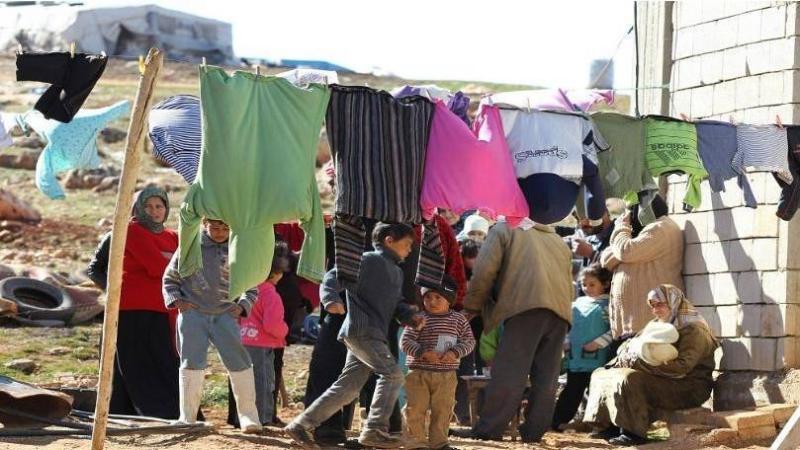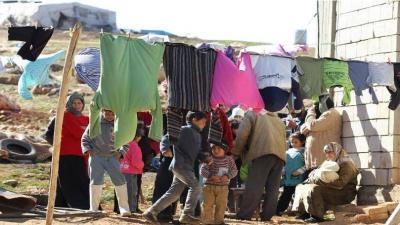With the steps that the relevant official bodies intend to take, the issue of Syrian refugees has started to gain pressure towards the international community, as the presence of refugees in Lebanon has surpassed the host country's capacity to bear their burdens. In the briefing provided by Foreign Minister Abdullah Bou Habib to the deputies during the foreign affairs session, and what was revealed by the deputies, Lebanon intends to take legal action against international organizations and entities involved in the refugee file to stop their unilateral dealings without coordinating with the state, urging them to provide lists with the actual numbers of refugees, while the numbers cited by various institutions conflict with those from the authorities.
It is perhaps rare for deputies within a parliamentary committee to agree on a stance regarding an issue and acknowledge the seriousness of the problem and the necessity of hastening to find needed solutions. During its meeting yesterday, the Foreign Affairs and Emigrants Committee, chaired by Deputy Fadi Alama, exposed the concealed realities of the Syrian refugees file and was shocked by the international community's and relevant organizations' dealings, particularly the United Nations High Commissioner for Refugees' (UNHCR) approach towards the Lebanese state concerning refugee issues.
The acting government’s Foreign Minister, Abdullah Bou Habib, attended the session and candidly explained to the deputies what is happening, demonstrating how international organizations fail to coordinate with the relevant government authorities regarding the refugee file and instead make independent decisions while refusing to share data concerning the status of refugees and true numbers of those present in Lebanon.
The parliament and the government have recognized the severity of the crisis, which is transforming into a ticking time bomb that could explode at any moment. The most vulnerable groups in Lebanon, due to the economic downturn, are marginalized and competing with Syrian refugees for their livelihoods, sharing the limited remaining services in Lebanon, which necessitates an official move from the government to address the crisis before it escalates.
The first steps involve Lebanon trying to reach an understanding with the UNHCR to support the integration of refugees into their original communities and to find a cooperation mechanism between Lebanon and Syria. During the committee discussions, the work of organizations dedicated to refugees came under scrutiny, with several deputies criticizing the associations and organizations working on the refugee issue that do not coordinate with the state and are independently funded from outside the state. Critiques included how international organizations informed the funding state that amounts would be cut from their budget allocated to assisting Lebanon to support Syrian refugees there. Additionally, international organizations had purchased subsidized flour quotas from the state using a loan from the World Bank, which Lebanese citizens will repay, to distribute bread to Syrian refugees.
In the education sector, organizations have provided support to a number of private schools in exchange for accepting Syrian refugee students alongside Lebanese students, paying the required amounts in US dollars while Lebanese citizens struggle to educate their children in such schools. In healthcare, Syrian refugees receive better treatment than Lebanese patients, as supporting organizations cover their bills in dollars.
Numerous examples were presented by deputies regarding the refugee situation; one attendee complained that when a Syrian refugee is arrested for theft, international organizations quickly expedite their release after paying the necessary bail, prompting car theft rings among Lebanese to enlist the help of Syrians, believing they could also be released in case of arrest for theft.
An official source concerned with the refugee file stated that burying heads in the sand and ignoring the reality of the crisis no longer benefits Lebanon, especially in the absence of a clear roadmap. Bou Habib explained to the deputies the actual position of international organizations towards Lebanon. During his visit to Brussels to participate in a conference related to refugees, the Lebanese Foreign Minister asked the relevant international authorities about their proposed solutions for the refugee crisis and whether they had a clear understanding of the Syrian crisis, or if the file would remain hostage to wait for a political solution, which is currently distant due to the world’s focus on other, more important issues.
Numerous reports have discussed the mechanism for distributing aid allocated to Syrian refugees in Lebanon, raising legitimate questions about how such aid is utilized, revealing that 30% of these funds are withheld for operational costs. Some associations may prefer to maintain the status quo of the refugees to remain beneficiaries of fictitious contracts for substantial sums. A report from the World Food Program criticizes the lack of transparency in approaching the refugee issue, indicating that funds allocated for Ukrainian refugees go to the country hosting them, stimulating the local economy, while the majority of Syrian refugees transfer their money back to Syria. Another report conditions that Syrian refugees must live with dignity after their return to their homeland, as if the dignity of living were attainable in the camps housing them in Lebanon.
From the perspective of the relevant authorities in Lebanon, the refugee file has become a significant burden that threatens to spiral out of control at any moment, especially as Lebanese citizens have lost their ability to purchase their necessities compared to refugees whose conditions have improved due to the fluctuating exchange rate of the dollar against the Lebanese pound. At the Brussels conference, the Lebanese foreign ministry urged international bodies to provide assistance to Syrian refugees in their homeland, especially as these organizations have accredited offices in Syria, emphasizing the need to share responsibilities and seek logical solutions to protect Lebanon's interests as well as those of the supporting organizations and countries.
The government has received additional support from the stance of the parliamentary committee, which will enable it to build a comprehensive strategy to solve the refugee crisis in cooperation with the commission and international bodies, coordinating with the source country, Syria. Foreign Minister Abdullah Bou Habib, who valued the stance taken by the deputies and their awareness of the difficulties surrounding the refugee file, spoke with "Nidaa Al-Watan" about a series of steps that the government will take to address this file, the first of which is requesting from the relevant entities lists of the numbers of refugees present in Lebanon, noting that last month, 150,000 refugees reportedly entered Lebanese territory, while only 155 left.
Recently, Lebanon was informed by UNICEF that donor countries decided to cut a third of the amount allocated to Lebanon ($250 million) in support of Syrian refugees. Organizations refuse to provide the government with lists of true numbers, citing the cessation of the information exchange agreement and to avoid notifying the Syrian regime of names, as if in ignorance of entrants and exits from its territory. Bou Habib asserts that there will be no forced return of refugees, but Lebanon has the right to know the true numbers, which the Ministry of Interior claims stands at two million refugees, while aid is provided for about 850,000 refugees. He revealed several steps to be taken, including legal actions against organizations and entities that refuse to cooperate with the official bodies handling the file.
The Lebanese government plans to send a message to UN Secretary-General Antonio Guterres to explain the reality of the situation regarding the continued presence of refugees in Lebanon, requesting from European donor countries a roadmap for the refugee presence in Lebanon and the remaining timeline for hosting them at a time when Lebanon can no longer meet the basic needs of its people.




